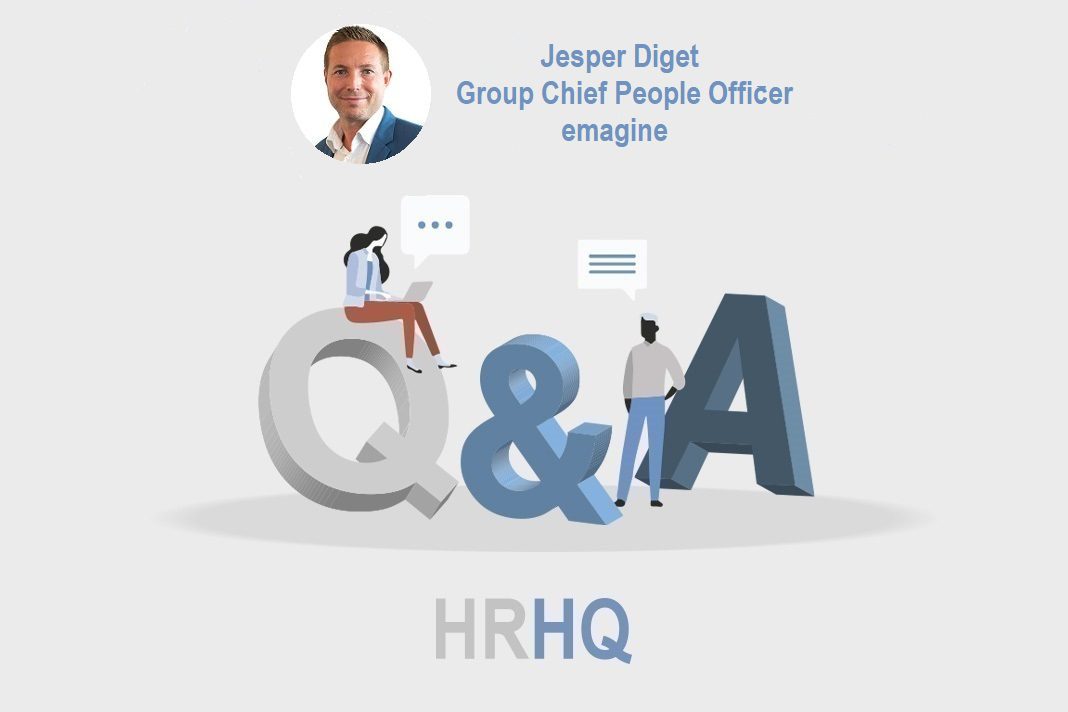Jesper Diget is Group Chief People Officer at emagine, a high-end business & IT consulting company challenging the way businesses leverage high-end expertise.
We asked Jesper to share his thoughts on HR, his career and the challenges facing him and emagine
HRHQ: Tell us about your career journey and what originally attracted you to a career in HR.
Jesper Diget: I have an elite sports background, so a lot of my younger years were spent on the national golf team. When I took a step back from golf, I pursued a financial degree at university, and I later found myself entering the world of HR by chance when a large company I was working at needed assistance in building a compensation and benefits program. It was this project that helped me discover my passion for the people aspect of HR, and I developed a strong interest in understanding how teams work and helping individuals grow.
HRHQ: What has been the most significant change in the HR world since you began your career?
JD: I think a major change in HRs role is the shift from being a traditional support function to a more strategic and integrated part of the business. It’s important for HR professionals to have a business-centric approach to their role and that means they should shape operations around the overall business strategies.
The move from being an afterthought to becoming leaders has been a notable transformation and I think HRs have a place at the senior leadership table now. HR professionals are now expected to contribute actively to decision-making processes and for HR teams to excel, they need to adopt a strategic way of thinking, to ensure they are pushing the boundaries and contributing to business success.
HRHQ: What is the most important HR challenge facing you currently?
JD: Dealing with multiple generations can be a challenge in the workplace. HRs need to find a way to make their company attractive to people in their 20s and 60s respectively, and they need to find ways to satisfy and reward existing employees in the various age brackets. The one size fits all concept is miles behind what we need to achieve as HR leaders today, and it’s important for us to cater for diverse needs and priorities.
Managing a global workforce, although brilliant in many ways, creates a number of obstacles. There are of course certain policies and initiatives that need to be adopted firm-wide, but responding to the desires of employees across multiple countries can be tricky. Data is an invaluable tool for HR professionals to gather feedback and implement changes that have been directly requested by the employees, so it’s advisable to encourage this. A quarterly employee satisfaction survey can be a significant tool to help with value and retention.
HRHQ: From an employee’s perspective, what does a great HR service mean?
JD: A great HR service is built on the foundations of accessibility and responsiveness. Being available when employees need support, whether that’s during the onboarding process, career development or addressing queries within a team, it’s a crucial cog in the machine.
I think creating a safe culture where the door is always open and employees feel comfortable discussing challenges is important. I also think it’s important for HR teams to upskill the leaders of teams within the business so that employees feel comfortable discussing issues with them, rather than relying solely on HR.
HRHQ: How should HR professionals design their career, and how much can you realistically career plan?
JD: I am proof of someone who has not designed or planned their career but if an individual is set on progressing in their HR role, there is a path they can follow. I think it’s important for them to diversify and gain as much experience as possible. Career progression may not be linear, and individuals should be open to diverse experiences to enhance personal and functional skills, as this will make them a better HR leader.
HRHQ: What advice would you give a person at the start of their HR career?
JD: I would say new HR professionals need to spend time grasping the business and sector they are entering and understand its key drivers. I believe they should prioritise gaining a deep understanding of the finer details – that could involve working in different areas of the business. For example, they should have strong insights into the value chain, understand the various functions and have a solid understanding of the numbers to ensure they have well-rounded expertise.
HRHQ: What soft skills do you believe are key to progressing your career?
JD: I believe HR professionals need to be brave to ensure they have a dedicated place on the leadership team of the organisation. I always encourage HR professionals to put themselves out there, express their opinions, and be a driving force in tackling challenges. Being resilient and open to continuous improvement is crucial for personal and professional growth. Alongside this, having positive communication skills and a strong people focus is fundamental.
HRHQ: What experiences should HR professionals try to get as they build up their CV?
JD: They should try and gain diverse experiences within HR, such as working on projects related to systems, bonus programs, development programs, and recruitment. I also encourage individuals to take on leadership roles and explore different aspects of HR to develop a well-rounded skill set. Building a CV that reflects a variety of experiences enhances the ability to contribute effectively to the business.
HRHQ: What are you most proud of in your career?
JD: I’m most proud of making HR relevant to top managers, meaning we have a seat at the table and we are part of the overall business’ success. It’s great to be actively involved in shaping its evolution.
HRHQ: What is the best part of your job?
JD: The best thing about my job is seeing people succeed. When someone is given an opportunity and they shine, it’s brilliant to see. There is nothing better than seeing a team collaborate and succeed.
HRHQ: Many thanks Jesper for taking part and we wish you and emagine the very best for the future.








